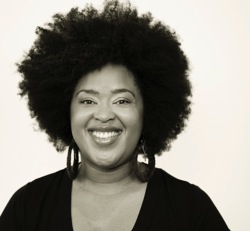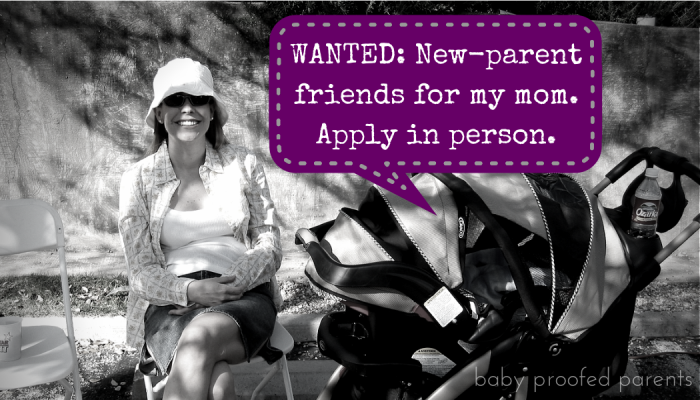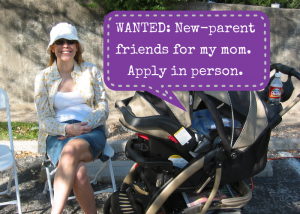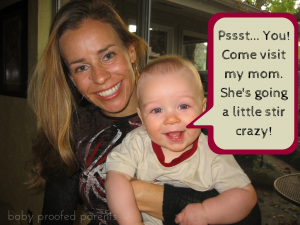Last November, English researchers published a study arguing that child-less couples are happier in their relationships than couples with kids. Within hours of the press release, the researchers’ claims were splashed around the Internet and a healthy, heated debate ensued. People argued that the research was flawed, that children brought immeasurable happiness and that the long-term benefits of being a parent outweighed the short-term strains on an intimate relationship.
Many of us parents (who were at home changing diapers and wiping snotty noses) did not participate in the debate. Instead we rolled our eyes and said, “Well… duh… we could have told you that!” It’s a widely known fact that having children takes a toll on a relationship: You can’t go on dates at the drop of a hat. You and your partner get less one-on-one time together. And if the two of you do sneak in some alone time, you’re often too tired to do anything other than watch a movie and doze off on the couch.
That being said, I’m going to argue that parents can prove the research wrong. As a counselor, I have observed many couples grow closer than ever after adding littles to their tribe. Watching your partner bring a child into the world and then morph into a mother or father can be a very sweet and endearing process. My advice is to capitalize on this new-found appreciation of each other, and then make a very deliberate and conscious effort to keep the spark alive. It can be done, I promise! Here are four suggestions for feeling closer than ever to your mate:
Share Your Gratitude: Get in the habit of thanking each other for the smallest things. Thank you for emptying the dishwasher. Thanks for giving me a breather and taking over with our colicky baby last night when I was about to lose it. I really appreciate how you didn’t dump your shoes in the middle of the floor when you came home yesterday. Thank you for picking up my favorite dark chocolate at the grocery store. Thank your partner, and then thank them again. The attitude of gratitude in your relationship will feed positivity and help you to appreciate your partner rather than resent them.
Re-Romanticizing Exercise: After a couple has been together for several years, they typically grow out of the habit of doing sweet things for each other. The reasoning: You’ve secured your partner. No need to charm or court them anymore, right? Wrong. In his book, Getting the Love You Want, Harville Hendrix gives his readers this assignment: Make a list of ten small gestures that make you feel special and loved. Ask your partner to do the same, and then exchange the lists. Need some inspiration for your list? Think back to when you and your spouse were dating. Some examples might be:
- Come home with flowers for no reason.
- Rub my shoulders for ten minutes.
- Bring me a cup of coffee in bed. (Better yet, with whipped cream and a dash of cinnamon on top!)
- Leave a sweet note on the fridge.
- Light a fragrant candle before I get home.
- Whip together my favorite dinner.
- Put fresh linens on the bed and then turn down the sheet.
- E-mail me a short poem.
You get the picture. After you’ve exchanged lists, commit to doing two things for your partner every week, unannounced, no strings attached. These random acts of kindness will help to naturally manifest an atmosphere of support and love.
Make Time for Couple Time: OK, we know that new parents do not have the time or energy to get out very often, if at all. But there are work-arounds to this dilemma. Set aside time for “home-dates”. Some examples: Cuddling on the couch while you watch your favorite TV show. Sharing a cup of coffee or a glass of vino on the back patio. Perusing the IKEA or West Elm catalog together for that rug you really need. When your babies are old enough to be left alone, book a babysitter at least once a month and get out on a date. You need to make time for each other. And that is an order!
Bedtime Compliments: I’m not referring to complimenting your partner for their bedroom skills, although that can’t hurt! Instead I encourage you get in the habit of sharing one thing that you love about each other before you go to bed each night. I love the sound of your voice on the phone. I really like how organized you are. I love that you are able to find the humor in the ridiculousness of being covered in spit up. You are so sexy when you dance around the kitchen in your pajamas. No matter how tired you are, it is nice to fall asleep knowing that you are appreciated in a very specific way.
OK, so I know what you are thinking: Do we really have to force these things in our relationship? Shouldn’t this stuff happen organically and spontaneously? Sure, that would be ideal. But when you are sleep-deprived and surrounded by diapers, dishes and dirty laundry, it is crucial to put aside time to connect with and appreciate your partner, or else the relationship can easily slip through the cracks.
According to the same research study mentioned earlier, it is the simple expressions of gratitude and appreciation that play a big role in fulfilling marriages. So be deliberate and conscious about making these gestures part of your relationship. And then give yourself and your partner time. As the years fly by, and your kids get older, you will find more and more time to connect, and the spark that you kept alive can be fanned into a full-fledged flame. Let’s make a collective effort to prove the researchers wrong and find romance in our relationships amidst the diapers, burp cloths and butt paste.
Here’s to sanity and sparks,
Kirsten


































